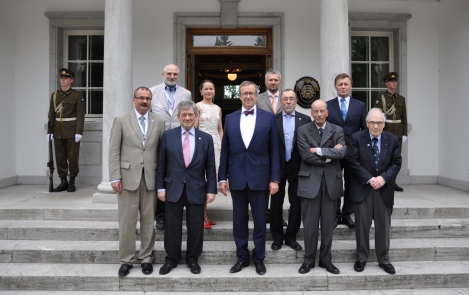-
Reset
+


International Learned Committee of the Estonian Institute of Historical Memory gathered yesterday in the Office of the President of the Republic
02.07.2016
The most recent meeting of the International Learned Committee of the Estonian Memory Institute, which was initiated by President Toomas Hendrik Ilves was chaired by the Chairman of the Committee, Spanish politician and former President of the European Parliament, Enrique Barón Crespo. The following members of the committee were also present: Professor Emeritus of University of Lund, Kristian Gerner; retired Finnish diplomat, Paavo Keisalo; Nicholas Lane from the United States of America, who with Keisalo was part of the International Commission for the Investigation of Crimes Against Humanity of Estonia, which sat from 1998 to 2009; Professor of History of University of Montreal, Yakov M. Rabkin; and Dr. Pavel Žáček, the first director of the Director of the Institute for the Study of Totalitarian Regimes of the Czech Republic.
In addition, the following people are part of the Learned Committee of the Estonian Institute of Historical Memory: Professor of European Studies at Oxford University, Timothy Garton Ash; Finnish writer and former member of the European Parliament, Lasse Lehtinen; German religious scholar and politician, former member of the Bundestag and current President of the Volksbund Deutsche Kriegsgräberfürsorge, an organisation that takes care of German war graves, Markus Meckel; and Professor in East European Studies at Stanford University, Norman M. Naimark. They were unable to attend the meeting in Tallinn on this occasion.
Member of the Board of the Estonian Institute of Historical Memory, Toomas Hiio, gave the Board an overview of the research efforts and activities of the Institute over the past year. The Board also discussed the options available for closer co-operation between the Institute and the House of European History, which is to be opened in November in Brussels. A comparative investigation of the communist regime in the Baltic States, which were formerly members of the Soviet Union, and the Eastern European countries, which had officially maintained their independence, yet were still under the control of the Soviet Union, were discussed. To obtain a wider perspective, the Board suggested comparing the communist regimes in Eastern Europe to the post World War II dictatorships in Europe.
In the afternoon, President Ilves held a dinner in honour of the members of the Learned Committee. Both the results of the research carried out by the Estonian Institute of Historical Memory in general and the history of the second part of the 20th century were discussed, based on the experiences and memories of those present, who represented both sides of the Iron Curtain.
President Ilves initiated the establishment of the Estonian Institute of Historical Memory in 2008. The research of the Institute will seek to determine the impact of Soviet rule on the human rights of the people of Estonia. Clearly, the results of such research must be measured against a set of standards that define universal human rights. The Institute will therefore take the Universal Declaration of Human Rights as its basis for determining the historical topics to be researched.
Office of the President
Public Relations Department



